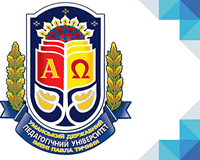Будь ласка, використовуйте цей ідентифікатор, щоб цитувати або посилатися на цей матеріал:
https://dspace.udpu.edu.ua/handle/123456789/12274| Назва: | Model Of Formation Of Future Teachers' Readiness To Work In Inclusive Education |
| Автори: | Demchenko, Irуna Lavrykova, Oksana Kuzmenko, Nadiia Kovalchuk, Olena Slipchuk, Valentyna Pilevych, Oksana |
| Ключові слова: | Disability Inclusive Education Inclusive Practice Inclusive Theory Inclusive Ethics Willingness to work Model Teachers' Readiness |
| Дата публікації: | лют-2020 |
| Видавництво: | INTERNATIONAL JOURNAL OF SCIENTIFIC & TECHNOLOGY |
| Бібліографічний опис: | Lavrykova O., Kuzmenko N., Demchenko I., Kovalchuk O., Slipchuk V., Pilevych O., Model Of Formation Of Future Teachers' Readiness To Work In Inclusive Education, INTERNATIONAL JOURNAL OF SCIENTIFIC & TECHNOLOGY, VOLUME 9, FEBRUARY 2020, pp. 410-414. |
| Короткий огляд (реферат): | The task of the authors of the article is to develop a theoretical, methodological, resource support for the rocess of forming the readiness offuture teachers to work in an inclusive education; in improving and testing tools for monitoring the readiness of teachers to work in mixed classes; in thestudy and analysis of the state of the investigated problem; processing data obtained during the experimental work; preparation of publications based onthe results of the study. The authors of the article paid special attention to the disclosure of such provisions: 1. The willingness of future teachers to workin an inclusive education environment is a stable personality trait that is an essential prerequisite for teaching children with disabilities and characterized by a focus on implementing the principles of inclusion in professional activities. 2. The structure of inclusive readiness includes key substantive components: inclusive ethics (a set of moral and ethical values and norms of an inclusive community, based on a set of personal qualities of a teacher important for working with “special” children); inclusive theory (knowledge needed to organize inclusive education for children); inclusive practice (pedagogical skills relevant to the implementation of an inclusive educational process). 3. The main criteria for the readiness of future teachers of inclusive education include: value-motivational (the adoption of the values of inclusion and the orientation of the teacher to implement the principles of "inclusion" in his pedagogical activity); personal (a set of personal qualities important for working in an inclusive environment); cognitive (the presence of clear, systemic knowledge about the basics of inclusive education); activity (practical skills based on theoretical knowledge that contribute to solving the problems of inclusive education). The reliability of the research results is provided by the validity of the methodology, its relevance to the problem posed, the use of a set of standard research methods, statistical verification of the significance of the results, and the possibility of repeating the study. |
| URI (Уніфікований ідентифікатор ресурсу): | https://dspace.udpu.edu.ua/handle/123456789/12274 |
| ISSN: | 2277-8616 |
| Розташовується у зібраннях: | Факультет дошкільної та спеціальної освіти |
Файли цього матеріалу:
| Файл | Опис | Розмір | Формат | |
|---|---|---|---|---|
| С_Демченко_Скопус2020.1.pdf | 829,13 kB | Adobe PDF | Переглянути/Відкрити |
Усі матеріали в архіві електронних ресурсів захищені авторським правом, всі права збережені.

